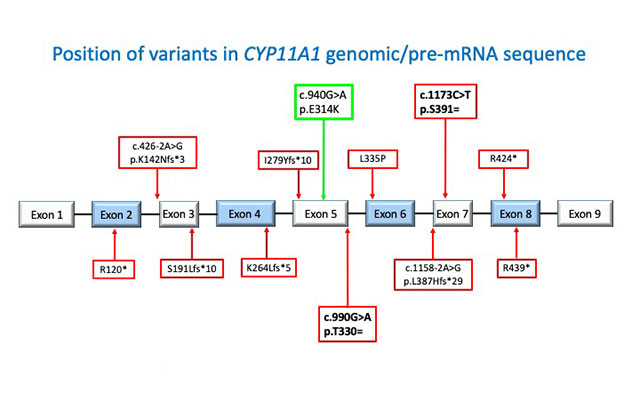Predicted Benign and Synonymous Variants in CYP11A1 Cause Primary Adrenal Insufficiency Through Missplicing
A joint international study led by researchers at Queen Mary University of London explores how variants that might be overlooked in standard analyses can be pathogenic when combined with much rarer disruptive changes.

Position of variants in CYP11A1 genomic/pre-mRNA sequence found in a series of patient with adrenal insufficiency. The relatively common variant that was seen in all patients (green) and other, rarer variants seen in the patients (red).
First published in the Journal of the Endocrine Society in 2019, the paper has recently been featured by the American Endocrine Society as part of Adrenal Awareness Month.
In the study researchers aimed to identify genetic changes which play a part in the development of glucocorticoid deficiency. Glucocorticoid deficiency is a very rare condition, which arises when the adrenal glands that sit on top of the kidneys, are not working properly.
They found that a “relatively common” change in a gene called CYP11A1, predicted to be benign, was linked to the disorder and is actually pathogenic.
Lou Metherell, senior author and Professor of Endocrine Genetics at Queen Mary said “Usually in this rare disease the genetic changes we find are also ultra-rare but the change we see is relatively common, especially in Europeans (present in ~1 in 200 of the population worldwide but about 1 in 120 in Europeans). We found it to be very common (1 in 5) in our patients which prompted us to investigate its pathogenicity.”
Avi Maharaj, first author and PhD student in the Centre for Endocrinology said: "Although the glucocorticoid deficiency can be easily treated with hormone replacement, it is important to define the underlying genetic cause as some gene defects cause problems in other organs too and this allows us to monitor patients and identify and treat these at an early stage. It also helps with assessing the inheritance risk to enable accurate genetic counselling. For example, in this case, the gene affected is CYP11A1 which can cause infertility since the hormones from the ovaries or testes can also be deficient.”
The importance of early diagnosis is highlighted in a follow up paper, in the European Journal of Endocrinology this year, describing the diagnostic odyssey of three Scottish brothers in whom the underlying cause was only identified in adulthood.
These findings show that a relatively common and predicted “benign” variant in CYP11A1 is a major contributor to adrenal insufficiency, especially in European populations. These observations have implications for personalized management and in the wider context demonstrate how variants that might be overlooked in standard analyses can be pathogenic.
Further Information
- Maharaj et al. Predicted Benign and Synonymous Variants in CYP11A1 Cause Primary Adrenal Insufficiency Through Missplicing, Journal of the Endocrine Society, Volume 3, Issue 1, January 2019, Pages 201–221, https://doi.org/10.1210/js.2018-00130
- Kallali et al. Long-term outcome of partial P450 side-chain cleavage enzyme deficiency in three brothers: the importance of early diagnosis. European Journal of Endocrinology. March 2020 Volume 182, Issue 3:K15-K24. doi: 10.1530/EJE-19-0696.